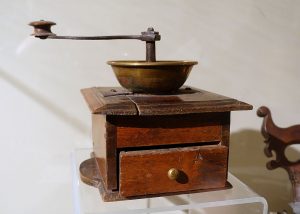By Barbara Crookshanks
With steaming cups in hand, today's Fredericksburg area coffee shops continue a tradition which dates back three centuries to the founding of the town.
Walk in gentlemen, rest at your ease,
Pay for what you call for, and call for what you please.
This verse hung over the doorway of The Coffee House in old Fredericksburg. Located in the first Market House/Town Hall on Caroline Street near William, it was here that 18th- and 19th-century Fredericksburgers sipped their favorite brew and pondered questions from the political to the classical.
Fredericksburg's first coffee house was in business soon after the town was founded in 1728. The popular "coffee woman" was Mrs. Susannah (Sukey) Livingston, a widow, who also served as a local "doctress." Her busy, if Spartan, establishment was on Sophia Street near the Rappahannock River wharf along with other wooden buildings which housed warehouses and a tavern.
Colonel William Byrd, the aristocratic Virginian who was a devotee of the famous London coffee houses, met Susannah Livingston at her Fredericksburg coffee house in 1732. He was taking a walk around the little village with its "top man" Colonel Henry Willis and penned a succinct description of the beginning of the new town of Fredericksburg:
"Colonel Willis walked me about the new town of Fredericksburg. It is pleasantly situated on the south shore of the Rappahannock River, about a mile below the falls. Sloops may come and lie close to the wharf, within thirty yards of the public warehouse which is built in the figure of a cross. The only edifice of stone yet built is the prison, the walls of which are strong enough to hold [notorious highwayman] Jack Sheppard, if he had been transported thither.
"Though this be a commodious and beautiful location for a town, with the advantage of a navigable river and wholesome air, yet the inhabitants are very few. Besides Colonel Willis, who is the top man of the place, there are only one merchant, a tailor, a smith, an ordinary-keeper and a lady, Mrs. Livingston, who acts here in the double capacity of a doctress and a coffee-woman."
Byrd must have found Sukey Livingston's establishment in decided contrast to the London coffee houses which he had known as a student and a member of the Bar of the Middle Temple. Serving the new drink brought by ships of the East India Company, they were centers of social and political life as early as the 17th century. Called "seminaries of sedition" by England's Charles II, coffee houses soon became centers for political and literary discussions. Poet laureate John Dryden and his friends made Will's Coffee Shop in Convent Garden a center of intelligent and witty conversation.
During the 18th century, London coffee houses numbered in the hundreds and every well-to-do Londoner had his favorite coffee house; ladies were not invited. Dr. Samuel Johnson, lexicographer and author, held forth at the Cheshire Cheese. His companions in conversation and coffee-drinking were his biographer James Boswell, author Oliver Goldsmith, statesman Edmund Burke, portrait painter Sir Joshua Reynolds, actor David Garrick and dramatist Richard Brinsley Sheridan.
Fredericksburgers followed Dr. Johnson and company's example. The Coffee House was a successor to Sukey Livingston's establishment. Here the Common Council was organized and the first meetings of the hustings court were held.
Another center of conviviality was Julian's Coffee House on the corner of Amelia and Caroline streets. George Washington was at Julian's on Christmas Eve of 1771 to confer with the overseer of the Washington Farm, just across the Rappahannock River and known today as George Washington’s Ferry Farm.
As a Revolutionary War hero, George was honored at a public dinner at the Market House/Town Hall Coffee House in 1784. Thirteen toasts were drunk, with a discharge of 13 rounds of artillery for each toast. The toasts began with "The Thirteen United and Sovereign States of America" and concluded with "The memory of all our gallant heroes who have bravely fallen in defense of American liberty."
General Washington then honored the company with a responding toast: "Fredericksburg: may it increase and its commerce flourish." That evening an elegant ball was given at the town hall so that the ladies could be included in the festivities, and the General remained until midnight.


